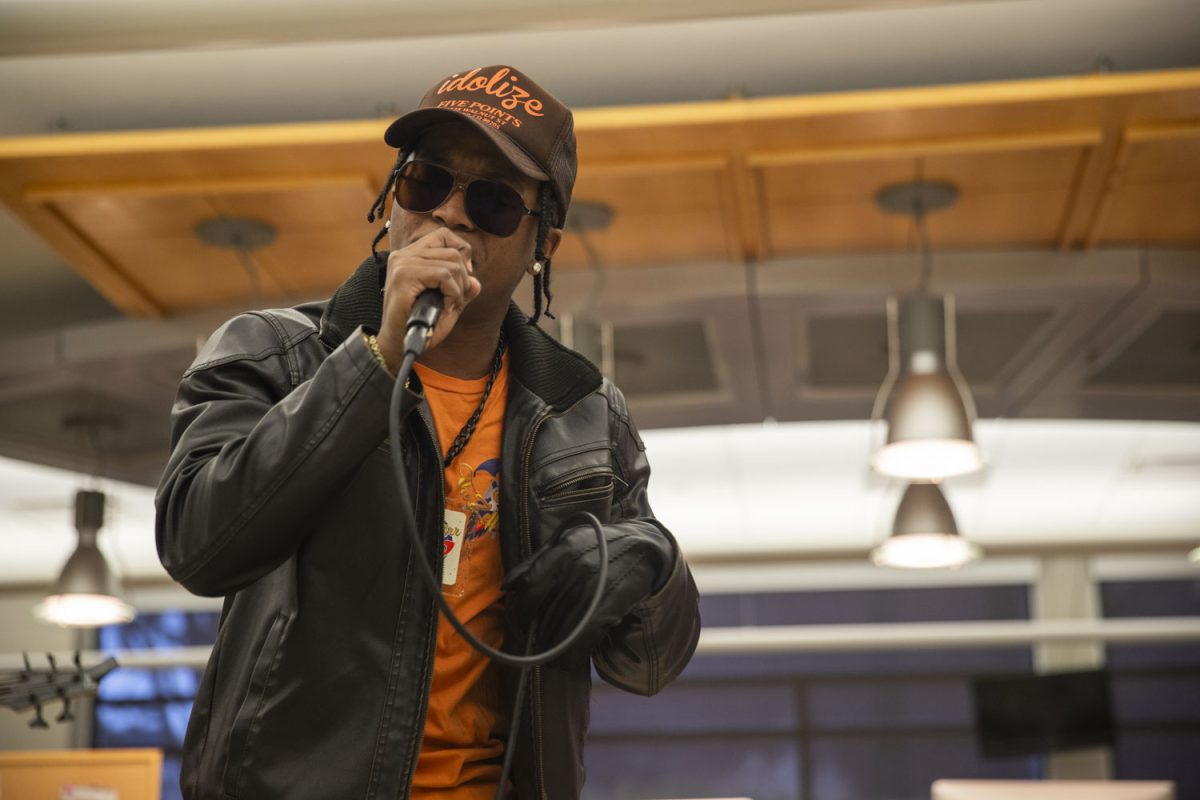A sign fills the Englert stage, a backdrop behind two lonely pianos and a drum set. The bass drum is adorned with mid-20th-century-looking text, giving the stage a big-band feel. The words on both the banner and the drum read “Piano Stomp.”
At 8 p.m. Friday, the Englert Theater, 221 E. Washington St., will take on the vibe of a Prohibition-era dance hall at Chase Garrett’s fifth-annual “Blues and Boogie-Woogie Piano Stomp.”
“It will kind of have this retro, throwback feel,” Garrett said.
For the “Piano Stomp,” he will bring in two artists who have been in the music industry for a long time, Ricky Nye and Kenny “Blues Boss” Wayne. Garrett will not only host the event, he will perform throughout the event — as he has for the past four years, since he was 22.
Chase Garrett
At 9 years old, Iowa City native Garrett was given a small keyboard and two free lessons for Christmas. The same year he received a ragtime genius Scott Joplin CD from his grandmother. Garrett had no interest in listening to the CD, but his parents made him. They also compelled him take piano lessons.
“I didn’t even want to,” he said. “But then I ended up totally loving it and making my career out of it.”
He originally became interested in blues and boogie-woogie from listening to his parents’ records and watching The Music Man as a young child; his favorite part of the musical was the barber-shop quartet. He also found unexpected inspiration from the film The Sandlot, which features a blues tune in the background.
Since he discovered his passion for 1920s and ’30s music, Garrett has graduated from the University of Iowa as well as became a piano practitioner, which allows him to fix, regulate, and tune pianos. He has also performed all over the United States and the world, and he just returned from a three-month piano tour of Europe.
He started out his career playing blues music, until he met Ricky Nye. One of the young musician’s biggest mentors, Nye introduced the 16-year-old Garrett to the world of boogie-woogie.
Ricky Nye
Ricky Nye began learning music from his uncle, a professional music instructor, at age 5. His father and his uncle also played in a band in his hometown of Cincinnati, and his mother took Nye to watch them rehearse.
“I remember it just like it just happened,” he said. “It was really life-changing and I was just like, ‘Wow, I’m going to play music.’ ”
Soon after listening to his father’s band, Nye took up the accordion and began playing in his family’s band when he was 12. During his teen years, Nye was a drummer, then he attended the Berklee College of Music in Boston. After college, Nye moved back to Cincinnati, where he began his own band, the Raisins. The group broke up in 1985, and Nye performed in a variety of bands, from funk to country. In 1978, he began working with Big Ed Thompson, which he described as life-changing.
In 1996 Nye was invited to play on the Arches Boogie Piano Stage at the Cincy Blues Fest in Cincinnati.
“I didn’t know anything about traditional boogie woogie,” Nye said. He was surrounded by piano-heavy dance numbers, borrowing aspects of blues, gospel, and country-western music. Nye was hooked.
Soon after the Cincy Blues Fest, Nye started working with numerous traditional boogie-woogie artists who would influence him to study the style of music. Today, he has played boogie-woogie throughout the United States as well as Europe.
Kenny “Blues Boss” Wayne
Before Kenny Wayne became the “Gentleman of Boogie Woogie” or the “Boss of Blues,” he was a kid from Spokane, Washington, singing in children’s choir at the local Methodist church and taking lessons from an older member.
Professionally, Wayne began to play music around 1960 with the Kenny Wayne Trio. Wayne performed with numerous rock groups when he was younger, playing with people from Santana to Delaney and Bonnie.
“I have always been able to play all types of music,” Wayne said.
Wayne discovered his New Orleans-style blues niche in Spain, when a British tourist requested a blues tune.
“I started playing a ton of blues, and my tips just started growing,” Wayne said.
He found it interesting that people in Europe were much more interested in the blues than people in the United States. In 1994, Wayne wrote his first blues record. Soon after, he began receiving awards and recognition, including the 2006 Blues Album of the Year at the Juno Awards, the 2010 Livng Blues Magazine piano player of the year, and five awards (and 14 nominations) from the Toronto Blues Society’s Maple Blues Awards.
“I found it must be the style of music that fits me,” Wayne said. “So that’s why I am now sticking with the blues.”
The Piano Stomp "party"
While pianists are the stars of Garrett’s annual stomp, Seth Kibel, who will be playing the saxophone in Friday night’s performance, said boogie woogie and blues afford him a sense of musical freedom as well.
“I love that this is a type of music that values personal expression,” Kibel said. “As the musician, I get to be an individual. No one else plays the saxophone exactly the same way that I do.”
Musician may tailor their sound to their own style, but Wayne said the result is still accessible to audiences the world over.
“This style of music is very down to earth, it’s pretty much about life,” Wayne said. “It’s the music that was actually born in America.”
If visitors are expecting a black tie piano concert, they will be surprised to find an upbeat, festive atmosphere filling the Englert Theatre. Garrett predicted audience members will be dancing in the aisles throughout the performance.
“It’s going to be a party,” Nye said. “It’s uplifting, it’s a guaranteed good time. People should expect a great time and some really good music.”
Kibel agreed.
“When you get such a group of talented musicians from all over the country who have never played together and put them on stage together, magic can and probably will happen.”
MUSIC






